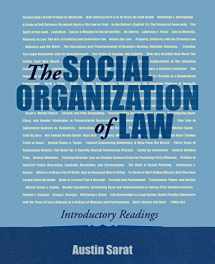
The Social Organization of Law: Introductory Readings
Book details
Summary
Description
Austin Sarat's The Social Organization of Law: Introductory Readings begins with a simple premise--law seeks to work in the world, to order, change, and give meaning to society--and describes legal processes as socially organized. This book connects legal studies to the study of society in two different senses.
First, the readings highlight law's responsiveness to various dimensions of social stratification. They also draw attention to the questions of when, why, and how legal decisions and actions respond to the social characteristics (e.g. race, class, and gender) of those making the decisions as well as those who are subject to them. These questions inevitably raise issues of justice and fairness, highlighting the moral dimensions of legal life.
Second, Sarat treats law itself as a social organization, emphasizing the complex relations between its various component parts (e.g., judges and jurors, police and prosecutors, appellate courts, and trial courts). The book examines the traditional subject of professional legal study--namely appellate court opinions--and describes some of the most pressing controversies of legal interpretation while questioning how those opinions take on meaning in social life. Sarat also questions whether those at the top of law's bureaucratic structure effectively control the behavior of others in the legal system's chain of command.
This anthology provides accessible, up-to-date materials (such as readings on terrorism and the challenges it poses to law, racial profiling, and gay rights) juxtaposed to the classics of the field. Introductions to each reading, along with the notes and questions written by the author, unpack the issues and engage students, enabling them to link the material from one chapter to another. Additional suggested readings provide stimulus for further inquiry.
The Social Organization of Law offers students a broad perspective that treats law as a set of institutions and practices combining moral argument, distinctive interpretive traditions, and the social organization of violence.


We would LOVE it if you could help us and other readers by reviewing the book
Book review




